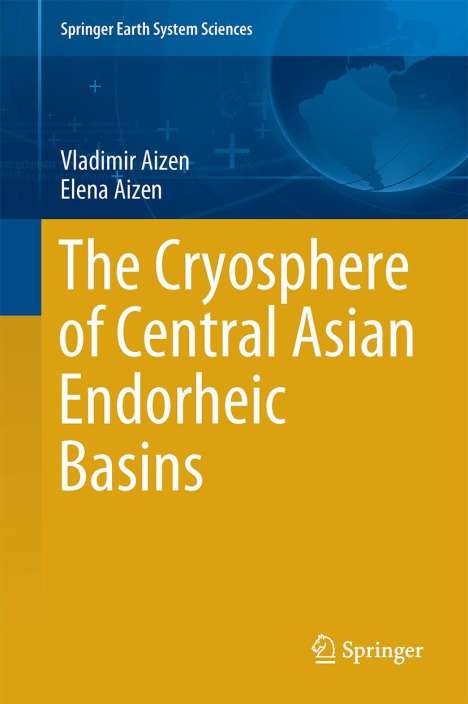Vladimir Aizen: The Cryosphere of Central Asian Endorheic Basins, Gebunden
The Cryosphere of Central Asian Endorheic Basins
(soweit verfügbar beim Lieferanten)
- Verlag:
- Springer, 05/2025
- Einband:
- Gebunden, Book
- Sprache:
- Englisch
- ISBN-13:
- 9789401786508
- Artikelnummer:
- 3888852
- Umfang:
- 450 Seiten
- Nummer der Auflage:
- 2022
- Ausgabe:
- 2022 edition
- Copyright-Jahr:
- 2017
- Erscheinungstermin:
- 13.5.2025
- Hinweis
-
Achtung: Artikel ist nicht in deutscher Sprache!
Kurzbeschreibung
This book surveys the unique Central Asian alpine cryosphere, its cycles of snow, glacier, permafrost and river runoff and its role in regional and global climate and hydrological systems. Uses remote sensed, ice-core and paleo-geomorphological data and more.
Beschreibung
The central Asian cryosphere is a part of our planet's climate and hydrological system, one that is especially at risk from climate change and global warming. The seasonal snow cover and glaciers' disappearance may affect the livelihood of millions of people in Central Asia. Water is both a crucial limiting resource and a central unifying element in many coupled human-natural systems, particularly in central Asian arid endorheic basins. Approximately 18% of the Earth s land drains to endorheic basins. The largest of these basins are in the interior of Asia. Endorheic basins are located mainly inland, surrounded by mountains, and fed by water from seasonal snow and glaciers. The diminishing glaciers and snow cover significantly affect endorheic basins hydrology and contribute to progressive land degradation. The disappearance of small glaciers from river basins has already led to a decline in river discharge, strongly affecting downstream agriculture and forcing people to move from their villages to densely populated settlements or rapidly growing urban areas, where the demand for water has exceeded the supply. Water for human consumption, agriculture, and industry in densely populated areas is especially essential in the World's arid and semi-arid regions. At the end of the 20th and beginning of the 21st century, central Asia oases began suffering from serious multi-year droughts in low river reaches, while spring flash floods and mudflows at upper and middle river reaches become more frequent. Understanding the component parts of cryosphere-hydrologic-ecological systems and linking them into a coherent picture is focus of the presented manuscript. In this primer, authors introduce the unique alpine cryosphere of central Asia and the role it plays in regional and global climate and hydrological system. After giving an overview, authors fully explain each component of the cryosphere and how it works in a natural system of seasonal snow-glaciers-permafrost-river runoff formation. Authors describe how snow and glaciers interact with atmosphere, endorheic basins hydrology and the feedback effect of changed cryosphere on regional and even global climate, water resources and environment. Authors used modern surface observational, remote sensed, ice-cores and paleo-geomorphological data to explain the glacial and inter-glacial periods, the cryosphere's interaction with past and contemporary climate and consider the changing cryosphere's future impact on climate, water resources and ecology in central Asia.
Inhaltsangabe
From the Contents: Central Asia mountain systems (Altai, Tien Shan, Pamir) and endorheic basins.- Central Asia cryosphere.- Seasonal snow cover and avalanches.- Glaciers.- Seasonally frozen ground and permafrost.- Central Asia Climate and Cryosphere.- Central Asia climate and atmospheric circulation (large scale and regional synoptic patterns).- Central Asia climate / cryosphere teleconnection patterns of the Northern Hemisphere interaction between atmosphere, land, and ocean processes.
Klappentext
This book is the first comprehensive research about central Asia cryosphere as a system, the unique natural system that maintains life in the world largest central Asia arid endorheic basin
This book is the result of many years original research in central Asia that employs surface observational remote sensing and deep alpine ice-coring data in simulation modern, past and future evolution of climate and alpine cryosphere in center of Eurasia
This book will be supplied with color photographs of beautiful alpine scenarios and web access to original data including high resolution satellite imagery
The readers will see an extraordinary interesting relationship between the atmosphere, climate, cryosphere and hydrological processes in arid central Asian endorheic basins and their role in existence of thousands of years central Asian civilization


